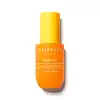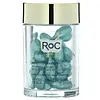What's inside
What's inside
 Key Ingredients
Key Ingredients

 Benefits
Benefits

 Concerns
Concerns

 Ingredients Side-by-side
Ingredients Side-by-side

Caprylic/Capric Triglyceride
MaskingHelianthus Annuus Seed Oil
EmollientTetrahexyldecyl Ascorbate
AntioxidantSimmondsia Chinensis Seed Oil
EmollientAdansonia Digitata Seed Oil
EmollientArgania Spinosa Kernel Oil
EmollientSqualane
EmollientPrunus Domestica Seed Oil
Skin ConditioningEthylhexylglycerin
Skin ConditioningEthylhexyl Palmitate
EmollientMauritia Flexuosa Fruit Oil
Skin ConditioningTocopherol
AntioxidantGlycine Soja Oil
EmollientTrihydroxystearin
Skin ConditioningSodium Hyaluronate
HumectantGlucomannan
Skin ConditioningCaprylic/Capric Triglyceride, Helianthus Annuus Seed Oil, Tetrahexyldecyl Ascorbate, Simmondsia Chinensis Seed Oil, Adansonia Digitata Seed Oil, Argania Spinosa Kernel Oil, Squalane, Prunus Domestica Seed Oil, Ethylhexylglycerin, Ethylhexyl Palmitate, Mauritia Flexuosa Fruit Oil, Tocopherol, Glycine Soja Oil, Trihydroxystearin, Sodium Hyaluronate, Glucomannan
Coconut Alkanes
EmollientSimmondsia Chinensis Seed Oil
EmollientCaprylic/Capric Triglyceride
MaskingCocos Nucifera Oil
MaskingEthylhexyl Palmitate
EmollientCoconut Alkanes, Simmondsia Chinensis Seed Oil, Caprylic/Capric Triglyceride, Cocos Nucifera Oil, Ethylhexyl Palmitate, Coco-Caprylate/Caprate, Ethylene/Propylene/Styrene Copolymer, Isosorbide Dicaprylate, Polyurethane-79, Sodium Hyaluronate, Trihydroxystearin, Glucomannan, Butylene/Ethylene/Propylene Copolymer
 Reviews
Reviews

Ingredients Explained
These ingredients are found in both products.
Ingredients higher up in an ingredient list are typically present in a larger amount.
This ingredient is an emollient, solvent, and texture enhancer. It is considered a skin-softener by helping the skin prevent moisture loss.
It helps thicken a product's formula and makes it easier to spread by dissolving clumping compounds.
Caprylic Triglyceride is made by combining glycerin with coconut oil, forming a clear liquid.
While there is an assumption Caprylic Triglyceride can clog pores due to it being derived from coconut oil, there is no research supporting this.
Learn more about Caprylic/Capric TriglycerideEthylhexyl Palmitate, also known as octyl palmitate, is created from 2-ethylhexyl alcohol and palmitic acid. It is a fatty acid ester.
The fatty acid content of Ethylhexyl Palmitate makes it an emollient. Emollients help soften and hydrate your skin by trapping moisture within.
Ethylhexyl Palmitate is also used to help improve the texture of cosmetics. It helps other ingredient dissolve in products and help disperse ingredients more evenly.
You'll likely find this ingredient in sunscreen, as it is often used to mix UV-blocking ingredients such as avobenzone and ethylhexyl triazone.
It can also help stabilize the fragrances in a product as a fragrance fixative.
Ethylhexyl Palmitate can be used to substitute mineral oil.
Due to its high fatty acid content, it may not be fungal-acne safe.
Learn more about Ethylhexyl PalmitateGlucomannan is a fiber created from the Konjac plant. It is an emulsifier and thickener.
The high polysaccharide content makes it great at adjusting the texture of products. (Kind of like starch).
Polysaccharides also help our skin stay hydrated.
This ingredient is water-soluble.
Learn more about GlucomannanThis oil comes from the seeds of the desert shrub called Jojoba. It is more commonly known as jojoba oil, a non-comedogenic oil.
Jojoba oil does not contain fragrance and has many fatty-acids, making it a great soothing ingredient.
It also contains Vitamin E, a great moisturizing ingredient. Vitamin E is also an antioxidant and protects your skin against oxidative damage.
This ingredient humectant properties, meaning it helps draw moisture from the air. This helps keep your skin hydrated.
While jojoba has antibacterial properties, it is only able to kill some strains of bacteria.
Studies also show it helps in wound healing. In fact, Indigenous cultures have used jojoba as a moisturizer and to help treat burns for centuries.
Fun fact: Jojoba oil similar to natural human skin sebum, so it has a great effect on dry skin. It is also promising with helping to regulate sebum production.
Due to its fatty acid content, Jojoba oil may not be fungal acne safe. We recommend speaking with a professional if you have any concerns.
Learn more about Simmondsia Chinensis Seed OilSodium Hyaluronate is hyaluronic acid's salt form. It is commonly derived from the sodium salt of hyaluronic acid.
Like hyaluronic acid, it is great at holding water and acts as a humectant. This makes it a great skin hydrating ingredient.
Sodium Hyaluronate is naturally occurring in our bodies and is mostly found in eye fluid and joints.
These are some other common types of Hyaluronic Acid:
Learn more about Sodium HyaluronateThis ingredient comes from Hydroxystearic Acid, a fatty acid, and glycerin. It is used to thicken oils.
Due to its fatty acid content, it is a natural emollient.
Creating trihydroxystearin involves using a chemical reaction between hydrogen and castor oil.
This ingredient may not be Malassezia folliculitis safe.
Learn more about Trihydroxystearin